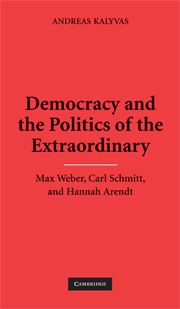Book contents
- Frontmatter
- Contents
- Acknowledgments
- List of Abbreviations
- Introduction: The Extraordinary and Political Theory
- I CHARISMATIC POLITICS AND THE SYMBOLIC FOUNDATIONS OF POWER
- 1 Revisiting Weber's Concept of the Political
- 2 Charismatic Politics
- 3 Disavowing Charismatic Politics
- II THE EXCEPTION AND CONSTITUTIONAL POLITICS
- III TAMING THE EXTRAORDINARY
- Conclusion: A Democratic Theory of the Extraordinary
- Bibliography
- Index
- References
1 - Revisiting Weber's Concept of the Political
Published online by Cambridge University Press: 04 August 2010
- Frontmatter
- Contents
- Acknowledgments
- List of Abbreviations
- Introduction: The Extraordinary and Political Theory
- I CHARISMATIC POLITICS AND THE SYMBOLIC FOUNDATIONS OF POWER
- 1 Revisiting Weber's Concept of the Political
- 2 Charismatic Politics
- 3 Disavowing Charismatic Politics
- II THE EXCEPTION AND CONSTITUTIONAL POLITICS
- III TAMING THE EXTRAORDINARY
- Conclusion: A Democratic Theory of the Extraordinary
- Bibliography
- Index
- References
Summary
One cannot fail to notice the sharpness of Weber's formal and realist definition of the political. Anticipating Schmitt's and Arendt's conceptual distinctions, Weber argued that the political delineates an independent sphere of human activity and institutional order sharply distinguished from the economic, the moral, the religious, and the aesthetic. Contrary to Schmitt and Arendt, however, he equated the state with the political in a way that the former successfully occupies the entire terrain of the latter. From a wide range of conflicts, Weber singled out as having a clear political character only those aiming at the seizure of the legitimate means of violence, that is, the state. Politics is repeatedly described as a struggle among competing collective entities (mainly political mass parties) over the acquisition of the state apparatus as the best way to influence the distribution of power and thus to secure and advance their material and ideal interests. And although he closely followed the German tradition of general constitutional law doctrines that equated the political to the state, he radicalized this approach by famously redefining the latter as the monopoly over the legitimate means of violence. This coercive capacity belongs to the bureaucratic machine of the state that, regulated by a formal system of impersonal and general legal rules, can better and more efficiently than other institutional devices administer large territories. Politics is oriented toward the acquisition of the “power pragma” and materialized in the superior organizational instance of the state.
- Type
- Chapter
- Information
- Democracy and the Politics of the ExtraordinaryMax Weber, Carl Schmitt, and Hannah Arendt, pp. 29 - 45Publisher: Cambridge University PressPrint publication year: 2008



